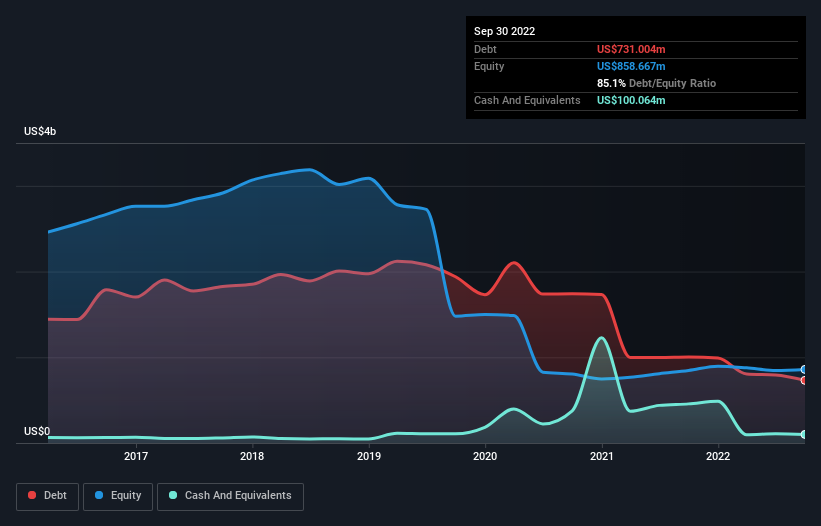
David Iben put it well when he said, 'Volatility is not a risk we care about. What we care about is avoiding the permanent loss of capital.' So it seems the smart money knows that debt - which is usually involved in bankruptcies - is a very important factor, when you assess how risky a company is. As with many other companies Pediatrix Medical Group, Inc. (NYSE:MD) makes use of debt. But the real question is whether this debt is making the company risky.
When Is Debt A Problem?
Debt is a tool to help businesses grow, but if a business is incapable of paying off its lenders, then it exists at their mercy. Part and parcel of capitalism is the process of 'creative destruction' where failed businesses are mercilessly liquidated by their bankers. While that is not too common, we often do see indebted companies permanently diluting shareholders because lenders force them to raise capital at a distressed price. Having said that, the most common situation is where a company manages its debt reasonably well - and to its own advantage. When we think about a company's use of debt, we first look at cash and debt together.
View our latest analysis for Pediatrix Medical Group
What Is Pediatrix Medical Group's Debt?
The image below, which you can click on for greater detail, shows that Pediatrix Medical Group had debt of US$731.0m at the end of September 2022, a reduction from US$1.00b over a year. However, because it has a cash reserve of US$100.1m, its net debt is less, at about US$630.9m.

A Look At Pediatrix Medical Group's Liabilities
Zooming in on the latest balance sheet data, we can see that Pediatrix Medical Group had liabilities of US$351.7m due within 12 months and liabilities of US$1.12b due beyond that. On the other hand, it had cash of US$100.1m and US$304.1m worth of receivables due within a year. So its liabilities total US$1.07b more than the combination of its cash and short-term receivables.
This deficit is considerable relative to its market capitalization of US$1.28b, so it does suggest shareholders should keep an eye on Pediatrix Medical Group's use of debt. This suggests shareholders would be heavily diluted if the company needed to shore up its balance sheet in a hurry.
In order to size up a company's debt relative to its earnings, we calculate its net debt divided by its earnings before interest, tax, depreciation, and amortization (EBITDA) and its earnings before interest and tax (EBIT) divided by its interest expense (its interest cover). The advantage of this approach is that we take into account both the absolute quantum of debt (with net debt to EBITDA) and the actual interest expenses associated with that debt (with its interest cover ratio).
Pediatrix Medical Group has a debt to EBITDA ratio of 2.5 and its EBIT covered its interest expense 6.6 times. Taken together this implies that, while we wouldn't want to see debt levels rise, we think it can handle its current leverage. One way Pediatrix Medical Group could vanquish its debt would be if it stops borrowing more but continues to grow EBIT at around 12%, as it did over the last year. When analysing debt levels, the balance sheet is the obvious place to start. But it is future earnings, more than anything, that will determine Pediatrix Medical Group's ability to maintain a healthy balance sheet going forward. So if you want to see what the professionals think, you might find this free report on analyst profit forecasts to be interesting.
Finally, a company can only pay off debt with cold hard cash, not accounting profits. So the logical step is to look at the proportion of that EBIT that is matched by actual free cash flow. During the last three years, Pediatrix Medical Group produced sturdy free cash flow equating to 66% of its EBIT, about what we'd expect. This free cash flow puts the company in a good position to pay down debt, when appropriate.
Our View
Both Pediatrix Medical Group's ability to to convert EBIT to free cash flow and its EBIT growth rate gave us comfort that it can handle its debt. Having said that, its level of total liabilities somewhat sensitizes us to potential future risks to the balance sheet. It's also worth noting that Pediatrix Medical Group is in the Healthcare industry, which is often considered to be quite defensive. When we consider all the factors mentioned above, we do feel a bit cautious about Pediatrix Medical Group's use of debt. While debt does have its upside in higher potential returns, we think shareholders should definitely consider how debt levels might make the stock more risky. There's no doubt that we learn most about debt from the balance sheet. But ultimately, every company can contain risks that exist outside of the balance sheet. These risks can be hard to spot. Every company has them, and we've spotted 3 warning signs for Pediatrix Medical Group (of which 1 is significant!) you should know about.
If, after all that, you're more interested in a fast growing company with a rock-solid balance sheet, then check out our list of net cash growth stocks without delay.
If you're looking to trade Pediatrix Medical Group, open an account with the lowest-cost platform trusted by professionals, Interactive Brokers.
With clients in over 200 countries and territories, and access to 160 markets, IBKR lets you trade stocks, options, futures, forex, bonds and funds from a single integrated account.
Enjoy no hidden fees, no account minimums, and FX conversion rates as low as 0.03%, far better than what most brokers offer.
Sponsored ContentNew: Manage All Your Stock Portfolios in One Place
We've created the ultimate portfolio companion for stock investors, and it's free.
• Connect an unlimited number of Portfolios and see your total in one currency
• Be alerted to new Warning Signs or Risks via email or mobile
• Track the Fair Value of your stocks
Have feedback on this article? Concerned about the content? Get in touch with us directly. Alternatively, email editorial-team (at) simplywallst.com.
This article by Simply Wall St is general in nature. We provide commentary based on historical data and analyst forecasts only using an unbiased methodology and our articles are not intended to be financial advice. It does not constitute a recommendation to buy or sell any stock, and does not take account of your objectives, or your financial situation. We aim to bring you long-term focused analysis driven by fundamental data. Note that our analysis may not factor in the latest price-sensitive company announcements or qualitative material. Simply Wall St has no position in any stocks mentioned.
About NYSE:MD
Pediatrix Medical Group
Provides newborn, maternal-fetal, and other pediatric subspecialty care services in the United States.
Very undervalued with adequate balance sheet.
Similar Companies
Market Insights
Community Narratives




